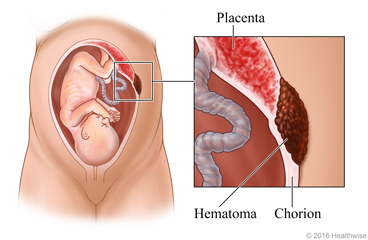Subchorionic Hematoma: Care Instructions
Overview

A subchorionic hematoma or hemorrhage is bleeding between the wall of the uterus and one of the sacs
(chorion) that surrounds the embryo inside the uterus. It is a common cause of bleeding in early pregnancy.
The main symptom is vaginal bleeding. But some people don't have symptoms. They may find out they have a
hematoma during an ultrasound test.
In most cases, the bleeding goes away on its own. Most people go on to have a healthy baby. But in some
cases, the bleeding is a sign of a miscarriage or other problem with the pregnancy. Your doctor may want to do
a follow-up ultrasound.
Follow-up care is a key part of your treatment and safety. Be sure to make and go to all
appointments, and call your doctor if you are having problems. It's also a good idea to know your test results
and keep a list of the medicines you take.
How can you care for yourself at home?
When should you call for help?
 Call 911
anytime you think you may need emergency care. For example, call if:
Call 911
anytime you think you may need emergency care. For example, call if:
Call your doctor now or seek immediate medical care if:
Watch closely for changes in your health, and be sure to contact your doctor if you have
any problems.
Current as of: July 10, 2023
Content Version: 14.0
Care instructions adapted under license by your
healthcare professional. If you have questions about a medical condition or this instruction, always ask
your healthcare professional. Healthwise, Incorporated disclaims any warranty or liability for your use of
this information.